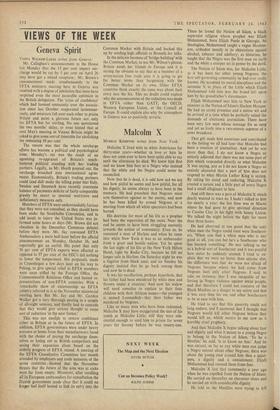VIEWS OF THE WEEK
Geneva Spirit
VANYA WALKER-LEIGH writes from Geneva:
Mr. Callaghan's announcement to the House last Monday that the 15 per cent import sur- charge would be cut by 5 per cent on April 26 may have got a mixed reception : Mr. Brown's announcement made simultaneously to the EFTA ministers meeting here in Geneva was received with a degree of jubilation that must have surprised even the most incurable optimists in the British delegation. The 'crisis of confidence' which had loomed ominously over the associa- tion since last October evaporated instantane- ously, and ministers fell over each other to praise Britain and paint a glorious future not only for EFTA but for sterling. No one questioned the two months' delay, or even hinted that at next May's meeting in Vienna Britain might be asked to give some sort of timetable for abolishing the remaining 10 per cent.
The reason was that the whole surcharge aflaire has become a political and psychological issue. Monday's cut was the result of an agonising re-appraisal of Britain's much- battered political standing with her trading partners. Legally, as Mr. Heath pointed out, the surcharge breached nine international agree- ments. Economically, Britain's trading partners could (and did) make the telling point that Italy, Sweden and Denmark have recently overcome balance of payments deficits of fairly comparable gravity by resort to internal restrictive and deflationary measures only.
Members of EFTA were understandably furious that they were not consulted, as they should have been under the Stockholm Convention, and to add insult to injury the United States was in- formed some hours or days (Mr. Brown did not elucidate in the December Commons debate) before they were. Mr. Jay convened EFTA Ambassadors a mere half-hour before the official announcement on Monday, October 26, and reportedly got an earful. His point that only 36 per cent of EFTA exports were affected as opposed to 57 per cent of the EEC's did nothing to lower the temperature. His proposals, made in Copenhagen a few days later on his way to Peking, to give special relief to EFTA members were soon stifled by the Foreign Office, the Commonwealth Relations Office and heated re- presentations of non-EFTA countries. With a remarkable show of statemanship no EFTA country referred to it at the November ministerial meeting here. But Mr. Jay and Mr. Gordon Walker got a very thorough pasting in a couple of all-night sessions, and finally had to concede that they would give serious thought to some sort of reduction 'in the near future.'
This was not enough to restore confidence either in Britain or in the future of EFTA. In addition, EFTA governments were under heavy pressure at home from their manufacturers faced with the choice of paying the surcharge them- selves or losing out to British competitors and seeing their expansion plans based on the orderly progress of EFTA ruined. A meeting of the EFTA Consultative Committee last month attended by employers and trade unionists of the seven countries showed that the November threats that the future of the area was at stake were far from empty. Moreover, after recalling all its European ambassadors for consultation the Danish government made clear that it could no longer feel itself bound to link its entry into the Common Market with Britain and backed this up by sending high officials to Brussels for talks.
In the delicate business of 'bridge-building' with the Common Market, to use Mr. Wilson's phrase, Britain needs her friends in Europe and it is stating the obvious to say that as a member of a seven-nation free trade area it is going to get far better terms than bargaining with the Common Market on its own. Other EFTA countries think exactly the same way about their entry into the Six. This no doubt could explain why the announcement of the reduction was made in EFTA rather than GATT, the OECD, Western European Union, or the Council of Europe. It could explain also why the atmosphere in Geneva was so positively ecstatic.


































 Previous page
Previous page